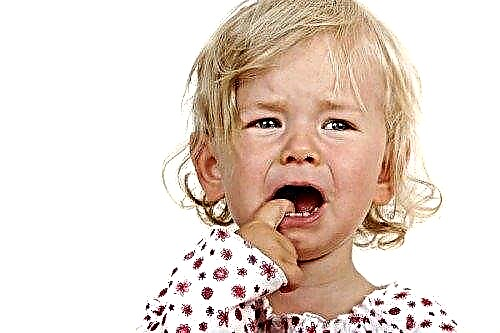
I am afraid of darkness. True. Not much, of course, not up to pathology, and not always, but in general I am afraid. It all started in childhood. I remember one day I did not sleep all night: my mother's coat on a hanger, which after cleaning was hung on a carnation to ventilate, suddenly "turned" into the Queen of Spades. I knew, of course, that it was a coat, but fear has big eyes! Moreover, the fantasy did its job - the Lady almost naturally "moved" and seemed to be looking at me. I called my grandmother. She was a resolute woman, in some places even tough; after the war, such huts were rebuilt and the fields were plowed.
My grandmother could not find a better solution than to make me walk through the entire dark room to this horrific hanger, so that I could see for myself that it was just a coat. I will not describe all my childhood horror in the process of overcoming several meters of that path. I can only say that the episodic fear of the dark remained with me as a reminder of my childhood.
I suspect that the grandmother chose the wrong method. Therefore, when my own children began to declare that Babayki, ghosts, aliens and other "there is someone there," settled in their rooms in the dark, I began to act in different ways.

Statistics
- Out of 100 mothers, 80 note that of all types of fear, their children are afraid of the dark. Thus, 8 out of 10 children aged 3 to 10 are afraid of dark rooms.
- In 80% of cases, fear of the dark is inherited. If the parents had it, then with a high degree of probability, the child will also be afraid of the dark.
- 10% of people on the planet have a fear of the dark for their entire life.
- In 2%, it develops into a disease - nyphobia.

Causes
The fear of the dark is not the fear of the absence of light as such. It is a fear of the unknown and unpleasant that may be hiding in this darkness. Since in the darkness our brain does not receive a clear signal from the organs of vision about the safety of the environment, a certain uncertainty arises. And if the fantasy is rich, then it will quickly "finish" the missing elements. And please - a terrible picture is ready! Children are known to have a greater ability to fantasize, and therefore childhood fears are so common.
Fear, as scientists have found, in a child begins even during intrauterine development. It is then that the baby is already able to feel if the mother is worried, frightened or very worried.
The unborn baby, of course, is not yet able to understand what exactly is happening, but his nervous system and brain perfectly “remember” the biological response to fear. As a result, the embryo gains the ability to be afraid. True, so far instinctively.

When does fear become conscious?
- More often than others, children who sleep alone experience fear of the dark. Therefore, indirectly, the fear of the dark is the fear of loneliness. Even newborns can experience it.
- If parents are addicted to "horror stories". “If you don’t eat porridge, I’ll call Babai” or “If you don’t stop indulging, an evil sorcerer will come for you!”. In the dark, when the child relaxes before going to bed and mentally, like adults, scrolls daytime experiences in his head, it is this “Babai” or “evil sorcerer” that can materialize in the child's imagination in a dark room.
- If in the presence of a child, elders watch horror films, they tell terrible stories. Remember, the brain of a child, even a small and unintelligent one, captures vivid images and then reproduces them at the most inopportune moment.
- If a child often watches news bulletins with adults. Any accidentally seen image in a plot of a disaster, murder or attack can cause fear of the dark.
- If the child is forbidden too much.
- If serious conflicts flare up in the family, in which children are drawn.

There are several other factors that contribute to the development of fear of the dark. Oddly enough, only children in the family are more susceptible to this type of phobia. When there is no sister or brother to contact, the child's level of anxiety is higher.
In addition, the fear of the dark is often inherent in children of "older" parents. The more the mother is at the time of the birth of the child, the more she and the household members worry about the "late" baby. They run at the first call, groan, gasp and throw up their hands. As a result, they have a neurasthenic, excitable, infantile baby, very prone to fears, and not only darkness.
Children from single-parent families are often afraid of the dark. Moreover, the first "bells" of fear fall, as a rule, during the period of divorce or the departure of one of the parents.

What should parents do?
1. Talk to your child
In all seriousness, kindly find out from him what exactly he is afraid of, why, who lives in his dark room, what can he do to the baby and why did he come at all? In other words, this way you can establish the factor that gave the “start” to the innate fear program.
2. Control what was seen
It is necessary to ensure that the child does not have access to watching bloody and frightening films, does not play the same computer games. Any fear is like a fire; if you throw wood into it, it will flare up more and more.
Watch your speech, try not to discuss negative topics in the presence of the child, and even more so, you should not frighten the naughty kid with evil characters who "will come and take him into the forest."


3. Explore the room and present the talisman
Try to explore the dark room with your child. Walk along it together or with the whole family, turning on the night light, and show the child that no one is hiding in any corner.
I will say right away that this advice does not always work. The fact is that in the presence of parents, the baby seems to calm down. And as soon as night falls and the lights are turned off, he categorically refuses to be alone. Because he sincerely believes that the monsters who were driven out by dad and mom will return. Therefore, I prefer "long term" prevention.
Mom and Dad leave someone or something in the child's room that can drive the monsters away. Let it be a specially purchased toy or a new night light. The main thing is for the child to believe that nothing threatens him with this thing now.
4. Visualizing fear and turning it into a kind being
Additional way. Ask your child to draw a monster - so he visualizes it and understands that he is not so scary, because the imagination always draws more "colorful" pictures. Be sure to turn the monster into a benevolent monster at the end, paint him a wide smile and kind eyes. Talk and play with him with your child.


What can't parents do?
- Criticize and laugh at the child. If your baby admitted that he is afraid to be alone in his room, to go to bed in the evening because it’s scary in the dark, do not criticize him or call him a coward. For you, the horror stories lurking at the closet are unrealistic. For a child, they are the most real. And he is not naughty when he communicates his fear, as some parents think, but expresses his confidence in you. He shares with you his main misfortune.
- Knock out "wedge with wedge". This is my grandmother's method. If the child is afraid of the dark, you should not deliberately close him in a dark room so that he realizes that there is no reason for fear. This can cause panic and perpetuate the horror, making it a real phobia.
- In no case should you be included in this game. If the kid says that a dragon lives under his bed, you don't need to look in there and exclaim: “Oh, what a really scary thing! If you don't obey, you will definitely come out and grab your leg! " The kid will believe. And the fear will intensify at times.


Effects
If parents ignore the child's fear of the dark and do not take action in time, the usual childhood fear can become a real pathology. Formed nyphobia will entail a whole tangle of various fears. This can cause nervous and mental disorders in a child, panic attacks throughout life.
In addition, childhood fears, hidden deep in the subconscious of a person, will become overgrown with a mass of unpleasant and unhelpful complexes for normal life. Perhaps the child will not become a sick person, but low self-esteem, fear of change and responsibility are guaranteed to him.
Age stages of fear
2 years
Children, as a rule, begin to be afraid of the dark at the age of 2, when their imagination is already sufficiently developed and capable of creating holistic images, including negative ones. But babies at this age still cannot clearly and in detail inform their parents about what worries them. Therefore, they can wake up at night, throw tantrums, stubbornly refuse to sleep in their crib and constantly ask to sleep with their parents.

3 years
At 3 years old, when the crisis associated with the first transitional age begins, the boundaries of the surrounding world for the child expand. He now knows that there is something else outside the apartment: a playground, a park, a kindergarten ... As experience and knowledge accumulate, fears also grow. The child is able to talk about them, draw them at your request. Take advantage of this to eliminate the cause of the fear.
4-7 years old
At 4 years old almost all children are incredibly impressionable. They have value judgments, they remember events, dialogues, faces well. Coupled with a wild fantasy, all this can lead to the fear of the dark.


At 5 years old the child actively communicates with peers, and a horror story told by someone in kindergarten or seen on TV can become a reason for night fears. The kid is not yet able to distinguish between fiction and truth, and his brain will immediately "draw" a frightening image. It is important to discuss fears with five-year-olds, reason for themselves and teach the child to think logically.
At 6 years old the child is able to “see” the characters of his favorite books and cartoons in the darkness of his room. Fantastic heroes, not always positive and kind, come, as luck would have it, closer to the night. And unless you fall asleep here!
In addition, associative thinking develops at this age. So, an ordinary chest of drawers can become an evil monster, and a hanging coat (as it was in my case) a mystical creature. It is important to demonstrate to your child that there is no one in the room.
At 7 years of age, fear of the dark can be a consequence of the stress a child experiences in connection with starting school. If persuasion doesn't help, rearrange the first grader's room. Let all the scary items change their location.
8-10 years old
At 8 years of age, the fear of the dark usually recedes. But if the child is still afraid, there is no need to ignore his problems, thinking that "soon everything will pass by itself."
At 9 years old, as well as at 10 years old, fear of the dark is not such a frequent phenomenon. And usually it is due to the fact that the psyche of a rapidly growing child is changing. This is a normal process, just everyone experiences it in their own way. Unless the fear of the dark is panicky, there is no reason to worry. With the help of a psychologist, parents can easily cope with an unpleasant situation.


When to contact a specialist?
- If the child is already 10 years old, and he is very afraid of a dark room and is afraid to sleep without light. Younger schoolchildren perfectly distinguish between truth and fairy tales. Therefore, stories about fantastic creatures living in the darkness of his room should be a reason for contacting a psychologist or psychotherapist.
- If the child's fear of the dark is associated with loud nocturnal tantrums, screams and even fear of death.
- If the fear of the dark is expressed in panic attacks. The child is breathing unevenly, loses consciousness.
Watch the video and learn what to do if your child is afraid of the dark.
Psychologist's advice
- The child's fear of the dark can only be overcome with him. The kid himself cannot cope.
- Correctly identified cause fears will quickly tell you how to wean your child from being afraid of the dark.
- If the child began to be afraid of the dark already at a conscious age (from 7 to 10 years), it makes sense to reconsider family relationships and find out how the child communicates in a team. Perhaps the reason lies in a conflict situation.
- Give your child extra physical activity - write in sections, circles, where a large release of energy is required from him. There will simply be no strength left for fears.
- Show by personal example how you can overcome fears.
- To captivate the child with drawing. The ability to transfer images from imagination to paper allows you to throw out emotions, and a drawn horror story ceases to be scary at all. Especially if the mother adds something from herself to the picture that will amuse the baby.
- A graphic test helps a lot in combating the fear of the dark. Schoolchildren can handle it. Have the child write about their concerns. Parse the "mini-essay" with him, and explain that the "scary" words are just words. Pay the attention of your son or daughter to how they are written.
- Use the game against fear. Such, for example, as hide and seek. After all, there you need to hide in dark places. And in the process of an entertaining game, the child will not have time to feel fear.
Sign up your child for a consultation with a psychologist, if fear goes beyond all reasonable boundaries, do not ignore his call for help, do not discuss it with strangers, so that the child does not lose confidence in you. There are situations when fear of the dark is a manifestation of very serious problems. The specialist will help you understand them and tell you how to help your child.
Watch the following videos in which psychologists give their advice.



